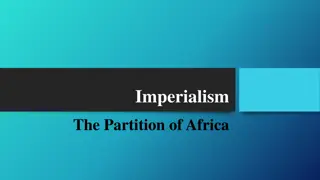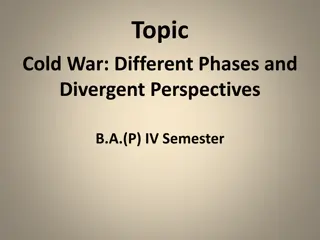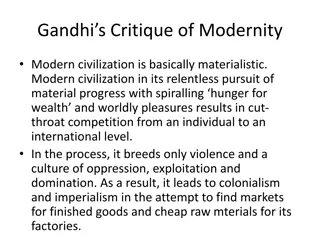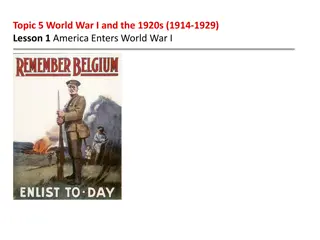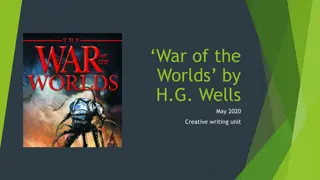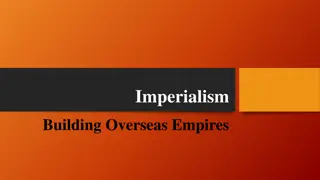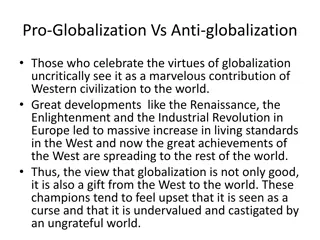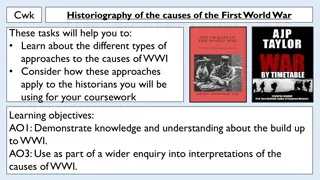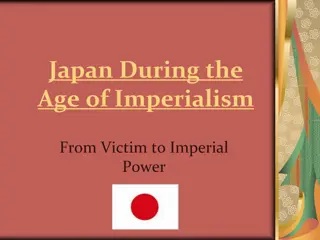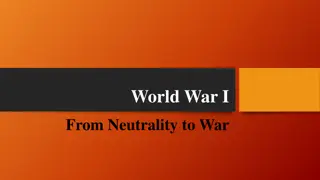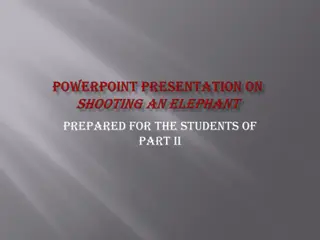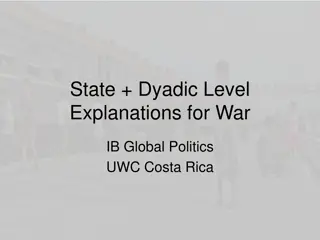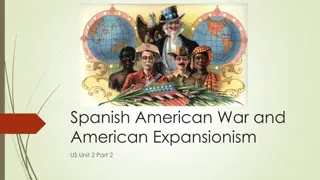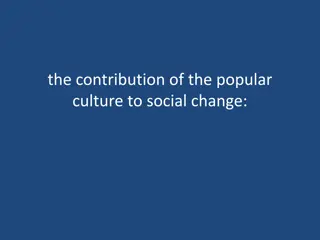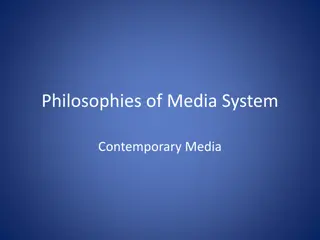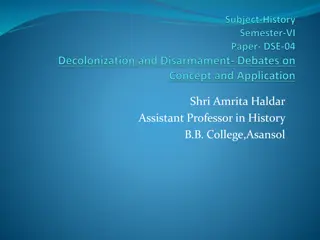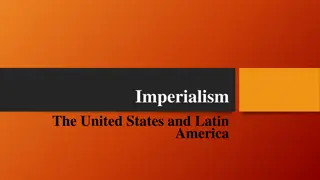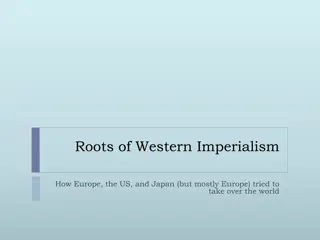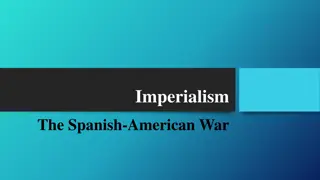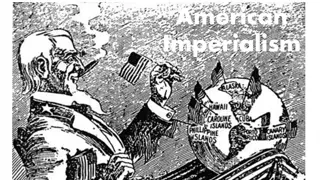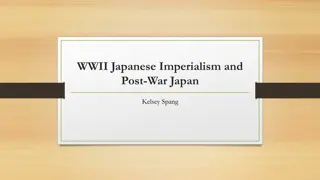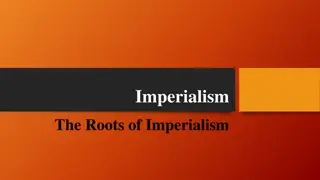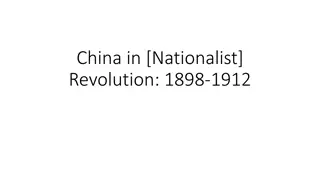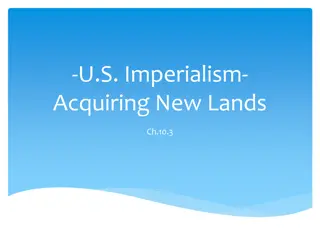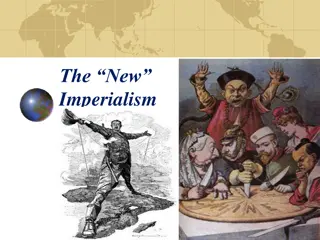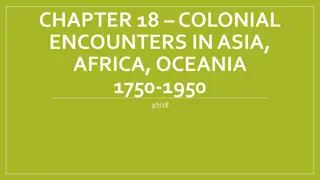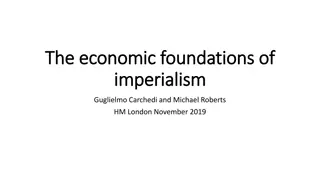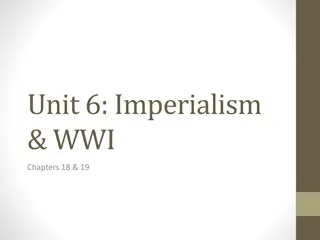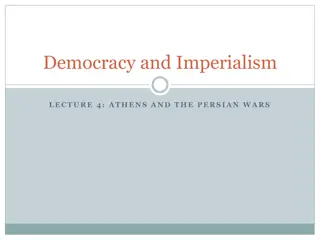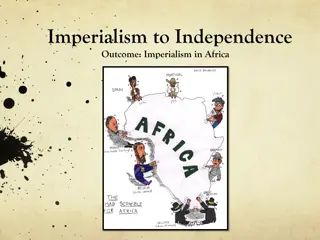European Imperialism and the Division of Africa in the 19th Century
European countries like Britain, France, and Germany began claiming African territories in the late 1800s, impacting indigenous populations and leading to various resistance movements. The Berlin Conference resulted in superimposed boundaries, affecting trade and resources. Islamic influences expand
0 views • 19 slides
Understanding the Cold War: Phases and Perspectives in B.A. IV Semester
Cold War, characterized by economic, political, and military competition between the US and Soviet Union, stemmed from ideological differences leading to global conflicts and proxy wars in the Global South, ultimately fueling neo-colonialism and neo-imperialism.
1 views • 15 slides
Gandhi's Critique of Modernity: A Thoughtful Analysis
Gandhi's critique of modern civilization delves into the materialistic nature of modernity, highlighting its detrimental effects on society, individuals, and the environment. He argues that relentless pursuit of wealth and worldly pleasures leads to violence, exploitation, and domination, resulting
0 views • 16 slides
America's Entry into World War I: Causes and Impacts
World War I and the 1920s witnessed America's transition from neutrality to active involvement in the war. Factors such as nationalism, militarism, imperialism, and alliances led to the conflict. The impact of technological innovations resulted in stalemate on the Western Front, leading to significa
0 views • 11 slides
The Impact of H.G. Wells' War of the Worlds on Popular Culture
H.G. Wells' iconic novel, War of the Worlds, explores themes of fear, imperialism, and the unknown. Published in 1898, it remains a timeless science fiction adventure, inspiring multiple adaptations in various media. Explore the historical context, the novel's lasting influence, and its adaptation i
0 views • 26 slides
European Imperialism in the Late 19th Century
European nations in the late 1800s pursued imperialism to expand their empires for economic, political, and social reasons. Motives included economic interests, political and military ambitions, and the ideology of Social Darwinism. The Industrial Revolution fueled the need for resources and markets
1 views • 14 slides
Understanding the Constitutional Background of Sparrow Case
Providing a comprehensive contextual understanding of the Sparrow case is crucial beyond just teaching the basic interpretive framework. The historical background of Sparrow, rooted in colonial imperialism and Indigenous sovereignty, shapes the constitutional rationale behind the interpretation of s
0 views • 10 slides
Globalization Throughout History: East to West Perspective
Globalization has shaped the world for centuries through trade, culture, and knowledge exchange. While some view it as a Western gift, others see it as a continuation of imperialism. Yet, globalization is not solely Western, evidenced by historical contributions from the East to the West. The flow o
0 views • 22 slides
Approaches to the Causes of World War I: Historiography Overview
Explore various historical perspectives on the origins of World War I, from the blame placed on Germany in the Treaty of Versailles to the revisionist and anti-revisionist interpretations that emerged post-World War II. Delve into differing views on nationalism, imperialism, militarism, and alliance
0 views • 13 slides
Japan's Transformation During the Age of Imperialism
Japan's journey during the Age of Imperialism saw it transition from isolationism to becoming an imperial power. From strict order under the Tokugawa shoguns to the Meiji Era's rapid modernization, Japan adopted Western influences to reform and militarize. The Treaty of Kanagawa in 1854 marked the e
1 views • 20 slides
World War I: Triggers and Ramifications
The causes of World War I, ranging from militarism and alliances to imperialism and nationalism, created a volatile environment in Europe. Nationalism led to heightened international rivalries, while militarism and an arms race added fuel to the fire. The quest for power, territory, and economic dom
0 views • 36 slides
Exploration of Colonial Discourse in George Orwell's "Shooting an Elephant
George Orwell's "Shooting an Elephant" delves into the psychological conflict of a police officer upholding British imperial rule in Burma. The narrative unravels Orwell's ambivalence towards colonialism, his struggles with authority and identity, and the complexities of power dynamics and moral res
5 views • 17 slides
Examining State-Level and Dyadic Explanations for War in Global Politics
Understanding the reasons why certain states are more war-prone than others involves exploring factors such as economy, internal opposition, and political systems. Marxist explanations argue that capitalist economies are more prone to war due to issues like overproduction, wealth inequality, and imp
0 views • 17 slides
Spanish-American War and American Expansionism: A Look Back in History
Explore the causes and impacts of the Spanish-American War, including the influence of Yellow Journalism, nationalism, and imperialism on American expansionism during the late 1800s. Learn about key figures like Theodore Roosevelt and the Rough Riders, and the significance of policies like the Monro
0 views • 25 slides
The Impact of Popular Culture on Social Change Through Television
Popular culture, as portrayed through television, holds the power to influence societal norms, intercultural understanding, and global awareness. While it can promote positive social change and awareness, there are concerns about cultural imperialism, excessive TV consumption, and the cultivation th
0 views • 15 slides
Violence Prevention and Trafficking of Indigenous Women, Girls, and 2SLGBTQQIA+ People
This content discusses key terms related to violence prevention and trafficking of Indigenous women, girls, and 2SLGBTQQIA+ people, including assimilation, colonialism, discrimination, grooming, human trafficking, imperialism, intergenerational trauma, patriarchy, racism, settler colonialism, sexual
0 views • 33 slides
The Family by Ba Jin: A Tale of Struggle and Revolution in 20th Century China
The Family by Ba Jin delves into the lives of the Kao brothers, highlighting their resistance against oppressive feudal authority in early 20th century China. The story follows the struggles of Kao Chueh-hsin, Kao Chueh-min, and Kao Chueh-hui as they navigate societal expectations and personal desir
0 views • 8 slides
Understanding Media Imperialism and Cultural Influence
Explore the concepts of cultural imperialism, media imperialism, and theories of communication in contemporary media systems. Cultural imperialism involves the influence of powerful cultures on less dominant ones, impacting cultural identity. Media imperialism refers to the one-way flow of informati
0 views • 12 slides
History of Australia: From British Convicts to Independence
The passage outlines Australia's history from the arrival of British convicts in 1788 to the establishment of an independent nation by 1901. It highlights the conflicts, societal developments, and impact of imperialism on the Indigenous populations. The text also discusses the formation of an Austra
1 views • 13 slides
Understanding Colonialism and Imperialism in Modern History
The discussion revolves around the impact of colonialism and imperialism on international relations, focusing on the historical context, economic consequences, and nationalist movements against colonial powers. Highlighting key players such as Great Britain, France, and Germany during the 19th centu
2 views • 14 slides
Understanding the Impact of World War I on Global History
Delve into the multiple causes and effects of World War I, such as militarism, imperialism, nationalism, and alliances. Explore how the global scope of WWI shaped the 1920s and 1930s, leading up to World War II. Gain insights into key events and dynamics of this transformative period.
0 views • 97 slides
Orientalism and Imaginative Imperialism in the Arabian Nights
This content discusses the intertwining of Orientalism, imperialism, and literature in works like "A Thousand and One Nights" (The Arabian Nights). It explores how intellectual and cultural energies influenced the imperialist perspective and translation of these texts, revealing deeper insights into
0 views • 8 slides
United States Imperialism in Latin America
United States' involvement in Latin America, particularly in Puerto Rico and Cuba, post-Spanish-American War, showcased a shift towards imperialism. Policies such as the Foraker Act and the Platt Amendment highlighted American efforts to exert influence in the region, leading to mixed reactions from
0 views • 25 slides
Unveiling the Roots of Western Imperialism: Europe's Quest for Global Domination
Exploring the origins and impacts of Western imperialism by examining how Europe, alongside the US and Japan, sought to exert control over various regions, particularly focusing on Africa. The process of colonization, the motivations behind imperialism, and the consequences for the colonized nations
0 views • 13 slides
American Imperialism in the Late 19th Century
Perception of manifest destiny, economic motives, and racial theories drove American expansionism in the 1890s, leading to overseas markets, acquisitions after the Spanish-American War, and debates over imperialism. Key figures, events, and ideologies shaped America's rise as a global power, includi
0 views • 13 slides
Unit Assessment Review: U.S. Imperialism History Lesson
Review session for upcoming history unit assessment on U.S. Imperialism. Topics covered include key events such as the Philippines under American control, reasons for Mark Twain's anti-Imperialist stance, factors driving American foreign policy towards imperialism, the case of Hawaii's Queen Liliuok
0 views • 15 slides
Causes of the Spanish-American War: Imperialism, Cuba, and Yellow Journalism
The Spanish-American War was fueled by imperialism, particularly the desire for colonies, as well as the unrest in Cuba against Spanish rule. American economic interests in Cuba, coupled with yellow journalism's sensationalized reporting, further escalated tensions leading to the conflict.
0 views • 25 slides
Exploration of American Imperialism Through Historical Events
American imperialism, characterized by extending control over weaker regions for economic and political gain, is exemplified through events like Hawaii's annexation and China's Open Door Policy. The impacts of imperialism on native populations, such as Hawaiians and the Chinese, raise questions abou
0 views • 13 slides
Democracy and Imperialism: Origins and Legacy of Classical Athens
The module explores the origins, nature, and legacy of democracy in Classical Athens (508-322 BC), shedding light on the political structures, principles, and impact of Athenian democracy. Topics range from the supreme authority of the Assembly to the accountability of magistrates, providing insight
0 views • 16 slides
American Imperialism in the Late 19th Century
The late 1880s and 1890s saw the United States embroiled in near-wars and diplomatic crises due to American expansionism. This included the annexation of Hawaii despite Queen Liliuokalani's opposition, and the debate over acquiring the Philippines for economic interests. Anti-imperialists argued aga
0 views • 5 slides
WWII Japanese Imperialism and Post-War Japan
Explore the historical narrative of WWII Japanese imperialism, the factors leading to Japanese control of Pan-Asia, interference from the West, rational for Pearl Harbor, and the aftermath including the fall of Japan and the devastating effects of the atomic bombs on Hiroshima and Nagasaki.
0 views • 17 slides
Understanding the Roots and Causes of Imperialism
The roots of imperialism trace back to the late 19th century when the U.S. transitioned to a major global player, acquiring territories and expanding influence beyond its borders. Economic benefits, such as access to raw materials and gaining a competitive edge, drove nations towards imperialism. Th
0 views • 16 slides
Chinese Nationalist Revolution: Prelude to Internal Tensions and Imperialism Redux
Prelude to the Chinese Nationalist Revolution explores the backdrop of internal tensions and Imperialism in China from 1895 to the early 1900s. The period witnessed a series of revolts against Manchu authority, including the Taiping Rebellion and self-strengthening efforts to adopt Western technolog
0 views • 30 slides
U.S. Imperialism: Acquiring New Lands and Foreign Influence
Explore the impact of U.S. imperialism through the acquisition of territories such as Puerto Rico and Cuba following the Spanish-American War. Discover the control exerted by the U.S. over these regions and how it influenced local governance. Delve into U.S. economic interests in Cuba and foreign in
0 views • 9 slides
The New Imperialism - Historical Overview of European Colonization
Explore the era of the New Imperialism through descriptions of North Africa, Egypt, Belgian Congo, and American missionary accounts. Learn about the impact of imperialism on various territories and the atrocities committed in the pursuit of resources and control.
0 views • 27 slides
Global Interactions and Imperialism in the 18th and 19th Centuries
This content covers colonial encounters in Asia, Africa, and Oceania from 1750 to 1950, focusing on the impact of European imperialism. It delves into the economic, political, and social dynamics of this period, highlighting factors such as linguistic separation, social Darwinism, and the consequenc
0 views • 11 slides
Economic Foundations of Imperialism: Exploitation and Value Transfer
Imperialism primarily functions as an economic mechanism for exploiting value rather than seeking political dominance. The transfer of value occurs through mechanisms like unequal exchange, global value chain flows, and capital flows, leading to the long-term appropriation of value by imperialist na
0 views • 28 slides
United States Foreign Policy Evolution from Imperialism to World War I
Explore the United States' foreign policy evolution from Imperialism to World War I, including the Open Door Policy, Dollar Diplomacy, and involvement in the Spanish-American War. Learn about the military actions in acquiring territories such as Puerto Rico, Guam, Philippines, and Hawaii. Delve into
0 views • 8 slides
The Impact of Athens and the Persian Wars on Democracy and Imperialism
The lecture delves into the historical events surrounding Athens and the Persian Wars, highlighting key milestones such as the expulsion of Hippias with Spartan help, Cleisthenes' reforms, and the rise of Archaic Greek imperialism in Athens and Sparta. Herodotus' perspective on the Persian Wars and
0 views • 21 slides
The Age of Imperialism in Africa: From Imperialism to Independence
The Age of Imperialism in Africa delves into the historical background of European domination, exploring factors such as European motives, societal impact, and the spread of Social Darwinism. It covers the transition from African trade in the 15th to 17th centuries to the eventual independence movem
0 views • 18 slides
